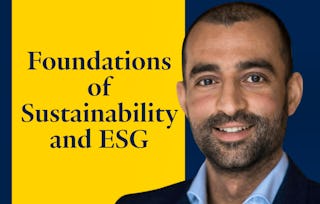The sustainability agenda is currently key to companies, governments and citizens. It’s vital for people to have first-hand knowledge of the basic concepts in order to understand all issues related to sustainability as a vector of systemic change in the economy, society, companies and our lives.

The ABC of sustainability

234 reviews
Recommended experience
What you'll learn
Understanding sustainability, learning about the use of natural resources and forming opinions about social and environmental issues.
Skills you'll gain
- Finance
- Critical Thinking
- Social Justice
- Environment and Resource Management
- Climate Change Mitigation
- Environmental Social And Corporate Governance (ESG)
- Sustainable Business
- Environmental Issue
- Economics
- Climate Change Adaptation
- Sustainable Development
- Sustainability Reporting
- Stakeholder Engagement
- Skills section collapsed. Showing 7 of 13 skills.
Details to know

Add to your LinkedIn profile
7 assignments
See how employees at top companies are mastering in-demand skills

There are 4 modules in this course
This module introduces the definitions of sustainability within a global context of permanent change affecting the current and future generations. The international sustainability reference frameworks are also presented.
What's included
8 videos17 readings2 assignments
Stakeholders are key to the sustainability of organizations. Throughout this module we’ll seek to understand the role of each of them and their expectations when it comes to creating economic, social and environmental value in the short, mid and long terms. We’ll also explore the concepts and definitions of the first sustainability pillar: “Environment”.
What's included
13 videos15 readings2 assignments
In this module we’ll learn some concepts related to the other two sustainability pillars: “Economic” and “Social”. The concept of inclusive and population growth within the framework of limited resources will be further explored. Human rights, gender equality and the relationship between the socio-economic SDGs and sustainable development will be covered in a cross-cutting manner.
What's included
4 videos11 readings2 assignments
In this final module we’ll examine the tools available for measuring and reporting sustainability. We’ll also summarize the previous modules to pool some conclusions and a vision of the global sustainability trends for the forthcoming decades of the 21st century.
What's included
3 videos9 readings1 assignment
Instructor

Offered by
Explore more from Environmental Science and Sustainability
 Status: Free Trial
Status: Free TrialUniversity of Colorado Boulder

University of Illinois Urbana-Champaign
 Status: Free Trial
Status: Free TrialSaïd Business School, University of Oxford
 Status: Free Trial
Status: Free TrialDuke University
Why people choose Coursera for their career

Felipe M.

Jennifer J.

Larry W.

Chaitanya A.
Learner reviews
- 5 stars
73.50%
- 4 stars
17.94%
- 3 stars
5.98%
- 2 stars
1.70%
- 1 star
0.85%
Showing 3 of 234
Reviewed on Sep 19, 2024
Very educational and informative. A little background on environmental science/economics would help a lot through the course.
Reviewed on Aug 1, 2024
Thank you. I understood some of the basics what does it mean sustainable practices.
Reviewed on Jan 9, 2024
Wonderful course to get a detailed idea about this expanding concept of Sustainability

Open new doors with Coursera Plus
Unlimited access to 10,000+ world-class courses, hands-on projects, and job-ready certificate programs - all included in your subscription
Advance your career with an online degree
Earn a degree from world-class universities - 100% online
Join over 3,400 global companies that choose Coursera for Business
Upskill your employees to excel in the digital economy
Frequently asked questions
To access the course materials, assignments and to earn a Certificate, you will need to purchase the Certificate experience when you enroll in a course. You can try a Free Trial instead, or apply for Financial Aid. The course may offer 'Full Course, No Certificate' instead. This option lets you see all course materials, submit required assessments, and get a final grade. This also means that you will not be able to purchase a Certificate experience.
When you purchase a Certificate you get access to all course materials, including graded assignments. Upon completing the course, your electronic Certificate will be added to your Accomplishments page - from there, you can print your Certificate or add it to your LinkedIn profile.
Yes. In select learning programs, you can apply for financial aid or a scholarship if you can’t afford the enrollment fee. If fin aid or scholarship is available for your learning program selection, you’ll find a link to apply on the description page.
More questions
Financial aid available,

